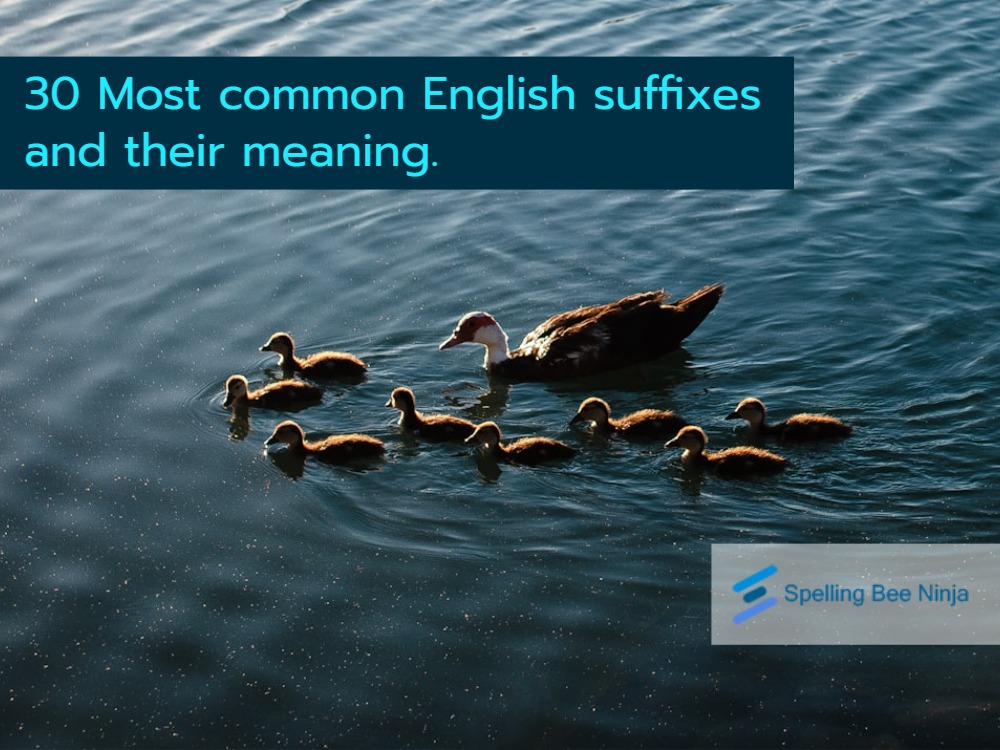- ✈️ How to Use Articles in English
- 🐝 Mastering Adjectives: A Key to Enhancing Your Writing Skills
- 🎮 Pronoun Puzzle: A Fun Way to Practice Personal and Possessive Forms
- 🎮 Adjective Adventure: Descriptive Word Search!
- ✈️ How to use prepositions in English
- ✈️ English Adverbs – 5 Quick and Easy ways to learn.
- The definitive pronouns list
- 🐝 Understanding conjunction words and where to use them
- ✈️ Modal Verbs in English: A Comprehensive Guide
- 🐝 Prepositions list – The definitive guide
- ✈️ Active and Passive Voice
- ✈️ What vs Which: differences and examples
- 🐝 Complete transition words list
- ✈️ How to Use Punctuation in English
- ✈️ Exploring the Difference Between “Will” and “Shall” in English
- ✈️ The Difference Between Could, Should, and Ought in English
- ✈️ Common Idiomatic Expressions in English
- ✈️ 40 English Prefixes and their meanings
- ✈️ 30 Most common English suffixes and their meaning.
- 🐝 Linking Words In English And How To Learn Them Effectively
- ✈️ Comparative and Superlative Adjectives
- ✈️ The Six Noun Types (Common, Proper, Countable, Uncountable, Collective, Abstract)
- ✈️ Understanding English Clauses: A Complete Guide
- ✈️ Understanding Sentence Structure in English
- ✈️ Gerunds and Infinitives: Understanding Verb Complements in English
- ✈️ Common Pronunciation Mistakes and How to Fix Them
- ✈️ Question Formation in English
- ✈️ Common Sentence Errors: Fragments, Run-ons, and Misplaced Modifiers
- ✈️ Say What?! A Fun Guide to Direct and Indirect Speech
- ✈️ Commonly Confused Words
- 🐝 ELA vocabulary: Essential English Language Arts Terms Every Student Should Know
- ✈️ Formal vs. Informal Language
- ✈️ Mastering Phrases in English Grammar
- ✈️ Conditionals (Zero, First, Second, Third, Mixed Conditionals)
- ✈️ Emphasis and Inversion in Sentences
- ✈️ Understanding and Using the Imperative Form
Suffixes are powerful tools in the English language that can greatly aid students, especially English as a Second Language (ESL) learners and K-12 students, in expanding their vocabulary and understanding word meanings.
A suffix is a group of letters added to the end of a word that modifies its meaning, often changing the word’s part of speech or adding nuance.
Learning suffixes helps students break down complex words, making unfamiliar vocabulary more approachable and easier to understand. For instance, knowing that -able means “capable of” or “able to be” helps students instantly interpret words like adaptable* or *readable*.
Additionally, suffixes can indicate a word’s grammatical function. For example, the suffix *-ment* transforms a verb like *move* into a noun, *movement*, while *-ly* often turns adjectives into adverbs, such as *quick becoming quickly.
Understanding suffixes not only improves reading comprehension but also enhances writing skills, enabling students to use more precise and varied vocabulary.
For ESL learners, familiarizing themselves with common suffixes can make English feel more systematic and less intimidating, as they start to see familiar patterns in new words.
For young K-12 students, suffixes add a layer of creativity and playfulness to language learning. They can build word “families” with the same suffix, which reinforces understanding and encourages exploration of language.
By recognizing and mastering these small but significant word parts, students gain confidence and fluency in English. As students encounter more words with familiar suffixes, their ability to interpret meaning improves, giving them greater independence and enjoyment in their language journey. Whether writing essays, reading stories, or simply communicating more effectively, suffixes are invaluable tools for building a strong vocabulary foundation.
31 English suffixes
1. -ful (full of)
– Examples: Helpful, Beautiful, Joyful
– Meaning: This suffix means “full of” and is often used to describe qualities.
– Use: If someone is full of joy, they are joyful.
2. -less (without)
– Examples: Hopeless, Fearless, Careless
– Meaning: This suffix means “without” and often implies a lack or absence of something.
– Use: Someone fearless is without fear.
3. -ness (state of being)
– Examples: Kindness, Happiness, Sadness
– Meaning: This suffix turns adjectives into nouns, describing a state or quality.
– Use: Happiness refers to the state of being happy.
4. -able / -ible (capable of)
– Examples: Lovable, Flexible, Edible
– Meaning: This suffix means “able to” or “capable of.”
– Use: Something edible is capable of being eaten.
5. -er / -or (one who)
– Examples: Teacher, Actor, Writer
– Meaning: This suffix often indicates a person who performs an action or role.
– Use: A teacher is one who teaches.
6. -ment (the action or result of)
– Examples: Enjoyment, Movement, Development
– Meaning: -ment turns verbs into nouns, describing actions or processes.
– Use: Movement is the act of moving.
7. -ly (in a certain way)
– Examples: Quickly, Happily, Carefully
– Meaning: This suffix often turns adjectives into adverbs, showing how an action is done.
– Use: If someone moves with care, they move carefully.
8. -ist (a person who specializes in)
– Examples: Artist, Scientist, Pianist
– Meaning: This suffix describes someone who is skilled in or practices a certain area.
– Use: A scientist studies science.
9. -ship (state or condition)
– Examples: Friendship, Leadership, Citizenship
– Meaning: This suffix describes a state, quality, or condition.
– Use: Friendship is the state of being friends.
10. -ion / -tion / -sion (action or process)
– Examples: Action, Decision, Translation
– Meaning: This suffix turns verbs into nouns that represent an action or process.
– Use: Translation is the act of translating.
11. -ous / -eous / -ious (full of)
– Examples: Dangerous, Courageous, Mysterious
– Meaning: This suffix describes a quality, often implying being full of something.
– Use: Something dangerous is full of danger.
12. -en (to make)
– Examples: Strengthen, Harden, Darken
– Meaning: This suffix turns adjectives or nouns into verbs, showing an action to make or become.
– Use: To darken is to make something darker.
13. -ive (having the nature of)
– Examples: Creative, Sensitive, Attractive
– Meaning: -ive turns verbs into adjectives, describing a quality or tendency.
– Use: Someone creative has the nature of creating.
14. -y (characterized by or inclined to)
– Examples: Sunny, Funny, Windy
– Meaning: This suffix describes a quality or tendency.
– Use: A windy day is characterized by wind.
Of course! Here’s a list of additional suffixes, including some that are slightly less common but very useful in English vocabulary.
15. -ify / -fy (to make or cause to become)
– Examples: Simplify, Beautify, Clarify
– Meaning: This suffix turns nouns or adjectives into verbs, meaning “to make” or “to cause to become.”
– Use: To simplify something is to make it simpler.
16. -ic / -ical (relating to or characteristic of)
– Examples: Historic, Musical, Logical
– Meaning: -ic and -ical often describe qualities or characteristics, turning nouns into adjectives.
– Use: Historic refers to something significant in history.
17. -ate (to make, to act)
– Examples: Activate, Motivate, Complicate
– Meaning: This suffix usually makes verbs that mean “to do” or “to make.”
– Use: To motivate means to cause someone to feel motivated.
18. -hood (state, condition, or quality)
– Examples: Childhood, Neighborhood, Brotherhood
– Meaning: This suffix often indicates a state or period of life.
– Use: Childhood refers to the state of being a child.
19. -ary / -ery / -ory (related to, place where)
– Examples: Library, Bakery, Laboratory
– Meaning: This suffix can indicate a place or relate to a specific function.
– Use: A library is a place with books.
20. -ance / -ence (state or quality)
– Examples: Importance, Persistence, Difference
– Meaning: This suffix turns verbs into nouns that describe states or qualities.
– Use: Persistence is the quality of continuing despite difficulty.
21. -ary (related to or connected with)
– Examples: Voluntary, Imaginary, Temporary
– Meaning: Often describes a characteristic or state of being.
– Use: Imaginary means relating to imagination.
22. -ise / -ize (to make or become)
– Examples: Realize, Organize, Modernize
– Meaning: This suffix means “to make” or “to cause to become.”
– Use: To modernize is to make something more modern.
23. -ity (state or condition)
– Examples: Purity, Simplicity, Reality
– Meaning: Turns adjectives into nouns, indicating a quality or state.
– Use: Purity is the state of being pure.
24. -esque (in the style of or resembling)
– Examples: Picturesque, Grotesque, Statuesque
– Meaning: Describes something in the style or manner of something else.
– Use: Picturesque means having qualities like a picture.
25. -dom (state or condition)
– Examples: Freedom, Kingdom, Wisdom
– Meaning: Indicates a state, condition, or realm.
– Use: Freedom refers to the state of being free.
26. -logy (the study of)
– Examples: Biology, Psychology, Geology
– Meaning: Indicates the study or science of something.
– Use: Biology is the study of life.
27. -phobia (fear of)
– Examples: Arachnophobia, Claustrophobia, Acrophobia
– Meaning: Refers to an intense fear.
– Use: Claustrophobia is the fear of enclosed spaces.
28. -ist (one who practices)
– Examples: Journalist, Biologist, Novelist
– Meaning: Refers to a person who practices or is concerned with something.
– Use: A biologist studies biology.
29. -ive (tending toward)
– Examples: Active, Creative, Inventive
– Meaning: Often describes a tendency or quality.
– Use: Someone creative has a tendency to create.
30. -cracy (rule or government)
– Examples: Democracy, Bureaucracy, Theocracy
– Meaning: Indicates a form of government or rule.
– Use: Democracy is a form of government by the people.
31. -ous (having the quality of)
– Examples: Curious, Famous, Generous
– Meaning: Describes a characteristic or quality.
– Use: Curious means having curiosity.
Tips for Learning Suffixes
– Break Down Words: Identify suffixes in larger words to understand the base meaning.
– Make a Suffix Journal: Keep a record of new suffixes and their meanings as you come across them.
– Practice with Flashcards: Write the suffix on one side and its meaning and examples on the other.
Mastering these suffixes will add depth to your vocabulary, helping you understand English words and their meanings more effectively! Happy learning!
– Practice by Parts of Speech: Knowing that some suffixes make verbs, nouns, or adjectives can help you choose the right one.
– Identify Patterns: When you recognize a suffix in a word, you can often guess its meaning by applying the suffix’s typical meaning.
– Make Word Families: List words with similar suffixes together to see how they change the root word.
– Use New Words in Sentences: Try forming sentences with words using new suffixes to reinforce their meaning.
Mastering suffixes can make learning English easier and more fun by expanding vocabulary and improving comprehension. Keep practicing, and you’ll be building words and sentences with confidence in no time! Happy studying!



